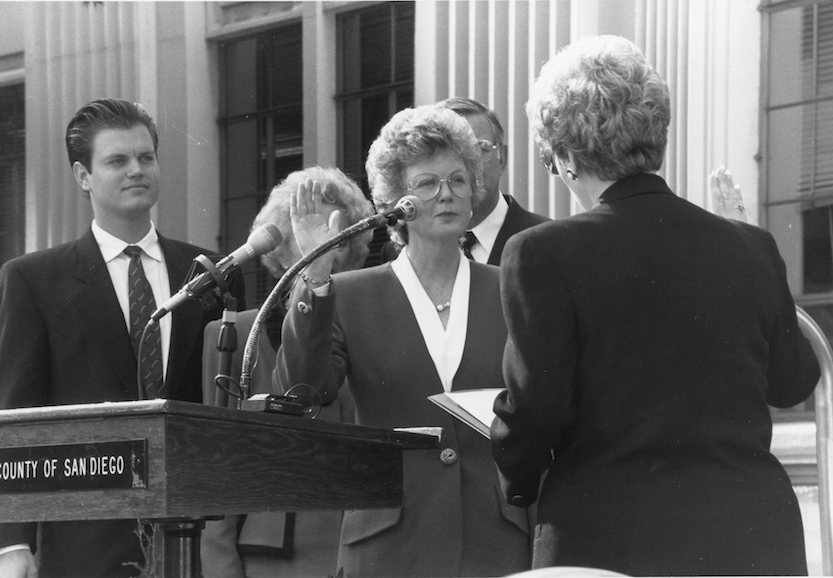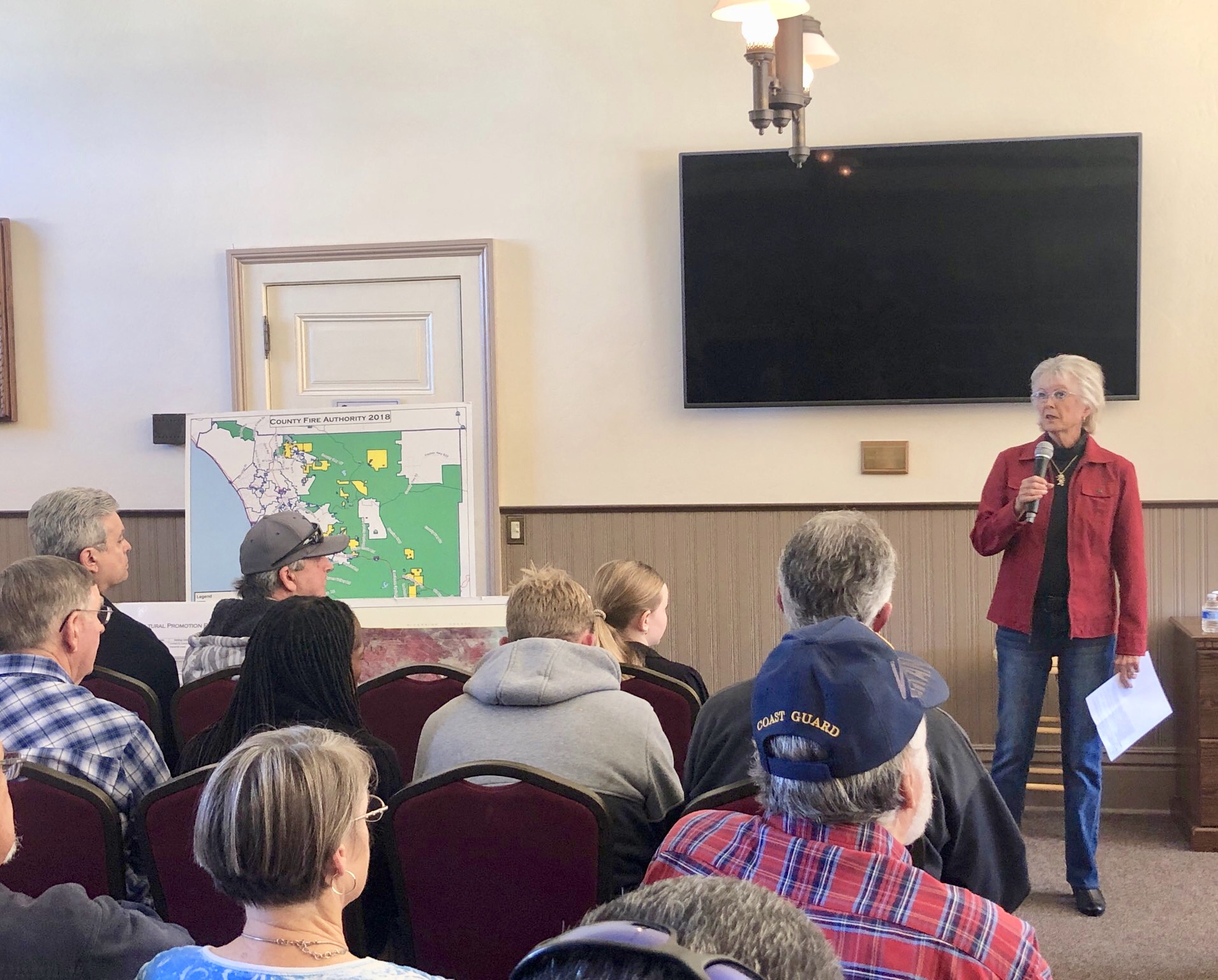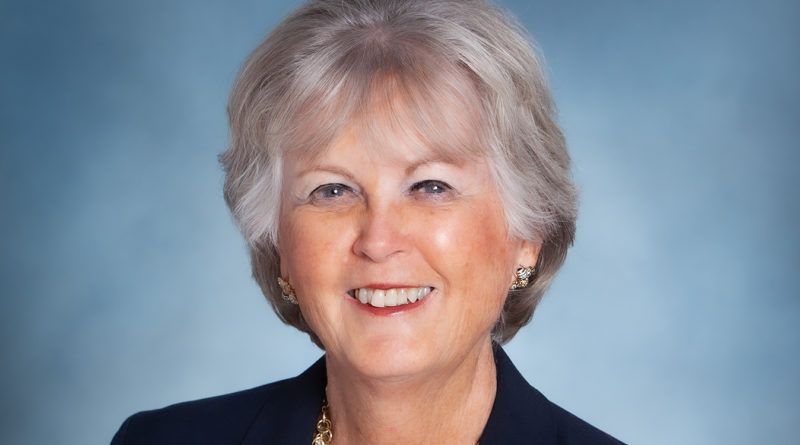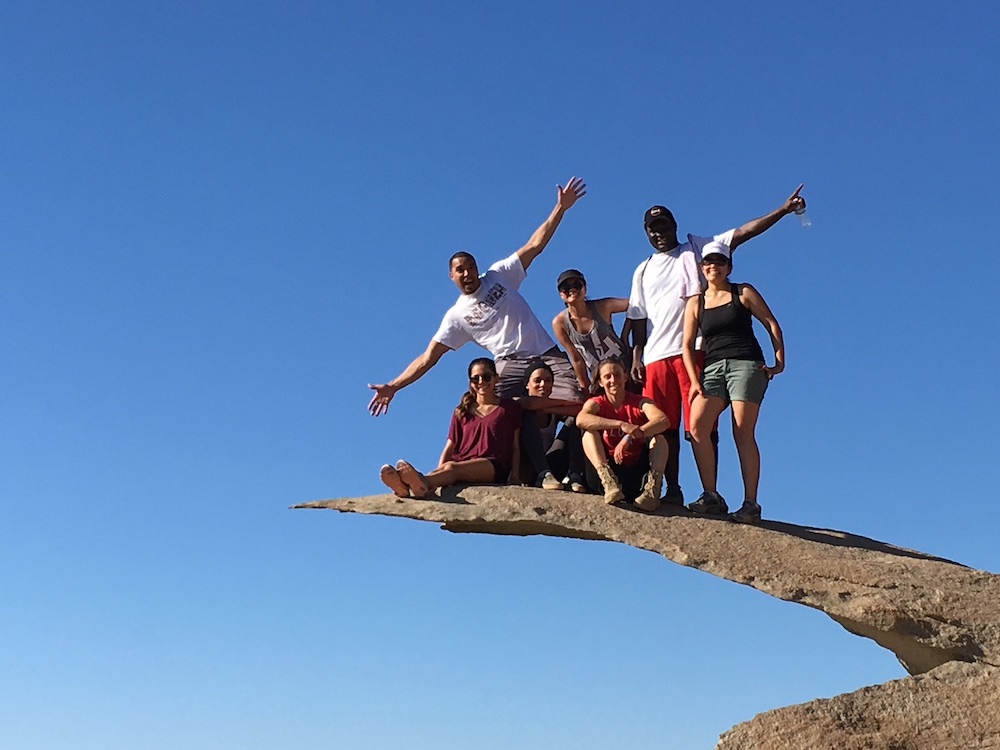THE IRON LADY OF EAST COUNTY
Dianne Jacob put her cowgirl dreams aside to lasso a 28-year career on the San Diego County Board of Supervisors
–She is now the longest-serving member of the Board of Supervisors and has held elected office longer than anyone in San Diego County history.
By Marsha Sutton
How does a painfully shy young girl grow up to become one of the most well-recognized and well-spoken public figures in San Diego County?
“In school, oh my gosh, when the teacher was calling on kids, I’d put my head down on the desk just hoping, hoping that the teacher didn’t call on me,” said District 2 County Supervisor Dianne Jacob, recalling how she was teased and called names when she was 5 years old because she needed to wear glasses.
To overcome her shyness and reluctance to speak in public, she forced herself to take a speech class in high school.
“What I learned is, you need to prepare what you’re going to say and you need to have a message to deliver to people, something that you feel is important,” she said.
Her strategy worked, clearly.
Jacob, who turns 81 this year, is now the longest-serving member of the County Board of Supervisors and has held elected office longer than anyone in San Diego County history. When she is forced to retire next January, after being termed out, she will have served 28 years on the board.
Her trajectory, from her early dream of being a cowgirl to a position of authority, is a story of determination and perseverance.
A third-generation San Diegan, Jacob grew up in the Rolando area of East County, graduated from Helix High School and received a teaching credential from San Diego State University.
Jacob credits her parents for instilling in her the value of hard work and appreciation for the importance of family.
“I had a really good upbringing,” she said. “My family was not wealthy; my dad worked hard for every dime, every penny he got. The support of my mom and dad I think is really basic to where I am today.”
She learned from them that nothing is impossible if you think it’s important. After graduating from college, Jacob taught mostly sixth grade for six years. “I loved teaching,” she said.
She met Paul Jacob, a jet pilot in the Navy stationed at Miramar, at a bowling alley. They eventually married in 1961. A few years later she quit teaching after her son, Tom, was born.
The Jacobs moved to a ranch in the Jamul area where they raised Angus cattle.
“We did it all, including making the little bulls into steers, which was always an interesting time,” she said.
The Angus operation went on for more than 20 years. During that time Jacob grew an organic garden, harvesting an extensive variety of fruits and vegetables, and enjoyed riding her horse.
“I was on a horse when I was 3 years old and always have ridden horses,” she said. “My dream was to grow up and be a cowgirl on a ranch. That was as close as I got to it.”
Her goal was to learn how to live off the land.
“We would butcher our own beef and I made soap and we raised pigs and pickled pigs’ feet,” she said. “We did all kinds of things. It’s a lot of hard work but it is a very healthy and rewarding way of life.”
Making changes
Jacob, who still lives on the same ranch in Jamul, said she was happy with her work there, “living the life, living the dream – with my horse and the cattle and the garden and all.”
At the same time she was also a volunteer at her son’s school in Jamul where she said the quality of education was “not good.”
“I remember going into one of the classrooms and seeing ‘I Love Lucy’ on the screen,” she said. “That was what they called school. There were no curriculum standards or anything.”

Jacob was recruited to run for a seat on the Jamul-Dulzura Union School District school board in 1975. She ran and won, she said, “on a platform of change and to do what I could do to make our schools in Jamul the best that they could possibly be.”
“I rode into my first school board meeting like Joan of Arc on a white horse, ready to change the world,” she said. But she learned quickly that three votes are needed to make change. “It’s kind of a basic lesson,” she said, wryly.
Two years later at the next election they had a majority on the school board, and improvements were made.
Jacob served on the school board for 17 years, eventually becoming involved at the state level and serving as president of the California School Boards Association in 1987.
Her first exposure to the San Diego County Board of Supervisors came while she was still serving on the school board, when a friend alerted her to a land use problem at the historic Winnetka Ranch in Jamul.
Jacob said a developer on a bulldozer was “just raping the heck out of the land.”
“We weren’t against growth,” she said. “We just wanted it done right with respect for the resources and the land and the historic [value].” The group won that battle.
Her second encounter with the Board of Supervisors happened shortly thereafter, with the proposed development of the Honey Springs Ranch, located five miles southeast of Jamul.
“We went to the Board of Supervisors opposing it,” Jacob said. “It was a classic example of leapfrog development – miles and miles away from services. This was wrong. And so we fought it.”
The group lost at the Board of Supervisors meeting but didn’t give up. “I got the legal defense fund of the Sierra Club to work with us because we couldn’t afford a lawsuit,” she said.
Under the Williamson Act, the court reversed the Board of Supervisors decision. “It was a 10-year court battle and we won,” Jacob said. “Honey Springs Ranch to this day is in open space and the public is enjoying it.”
Her experiences before the Board of Supervisors made an impact on Jacob.
“That really got me interested in those five people that sit there,” she said. “I watched people get up in front of the board. It was when Lou Conde was chair of the board. He treated people badly.”
She said she remembered one woman testifying before the board and “he just ripped her to shreds and she was crying.”
Even though she was involved in the supervisor elections in the late 1970s and was appointed to the County Planning Commission, she still wasn’t ready to run.
“I went about my school board business and ranching business,” she said. Then in 1990 she was recruited to run. “People said, ‘Dianne, you’ve got to do this.’ I said okay, I’ll give it a try. So the rest is pretty much history.”
She started running in 1990, was elected in November 1992 and took office in January 1993.
Achievements
After serving 27 years representing District 2 on the Board of Supervisors, Jacob’s list of accomplishments is lengthy.
“My passion has always been kids,” she said. “That goes back to my teaching days. As an elected official I learned on the school board that you can make a difference.”
“We probably built over 200 facilities of one kind or another,” she said, mentioning sports fields, gyms, pools, playgrounds, open space, nature trails and other parks and recreational facilities.
Giving kids the opportunity to play sports remains important to her, because “you learn life skills, you’re keeping kids out of trouble, and they’re getting good exercise,” she said.
The environment has also benefited from Jacob’s efforts. She co-authored the county’s Multiple Species Conservation Plan in 1998, helped open the Santa Ysabel Nature Center in 2019, and worked to improve public access along the San Diego River and in the San Dieguito River area.

Libraries too were a focus. “I think we built 13 libraries in my district and two more to go, hopefully,” she said. “At least I’ll get them started by the end of the year.”
Improving services for seniors has also been one of her top priorities. In 2014, she launched The Alzheimer’s Project to create a regional roadmap for addressing Alzheimer’s and other forms of dementia.
But perhaps her greatest impact has been her focus on fire protection.
Back in the early 1970s, the county contracted with the California Department of Forestry and Fire Protection, now known as Cal Fire, for fire protection for the entire unincorporated area. But in the mid 1970s, there was a proposal to terminate the contract, she said.
Before she was elected, Jacob objected publicly to terminating the contract, but the board did it anyway, saying it was too expensive.
“They basically told the unincorporated area people, ‘You’re on your own. You can either form a fire district, you can form a volunteer fire department, or you can do nothing.’ So when I came into office I felt that was really wrong.”
Jacob worked to get the county to pony up more money for fire protection. But nothing really happened until the 2003 Cedar fire.
“The Cedar fire,” she said, “was a moment in time that should be remembered because it was the very first time in San Diego County history that a fire that started in the back country ended up in the cities.”
Then at last all five supervisors “were on board to really engage and invest in the fire protection in our back country,” she said.
Before that, she said it felt like the board was telling her and then District 5 Supervisor Bill Horn, representing the two districts with most of the county’s back country, that they were on their own.
“And then of course after that was the 2007 fire, but we’d already started investing heavily,” she said, with more than $500 million spent on firefighting improvements such as new stations, aircraft, bigger and better-trained firefighting forces and other protections.
“We’ve got 1.5 million rural acres that now have fire protection and emergency medical services that are equal to any city fire department or fire agency,” she said. “And in the last ballot, the voters voted to put fire protection in the county charter.
“So the county will be in the fire business in perpetuity. It’s a good thing not just for the unincorporated area but for the region.”
But Jacob was quick to point out that none of these efforts could have happened without first focusing on the county’s finances.
When she first took office, “county government finances were upside down,” she said. “It was a broken county government at the time.”
She said cost-cutting measures to stabilize the budget, which in the mid-1990s was experiencing a $50 million shortfall, included selling off the trash system for $160 million, outsourcing the IT department and other government services, reforming the county pension benefits which she said saved taxpayers $2.2 billion over 20 years, paying cash for many projects which she said has saved taxpayers over the years more than $1 billion in interest payments, and other actions.
“A lot of attention went to fixing the finances of county government and that has enabled us to do a lot,” Jacob said. “That’s what earned us the Triple A credit rating.”

Disappointments
Alongside her accomplishments of increased fire protection, responsible land development, services for children and seniors, and helping to fix government finances, there have been disappointments.
“One has to do with the sexually violent predators,” she said. “That’s been very frustrating to me because a sexually violent predator should be locked up for good and nowhere near our community.”
At hearings, decisions seem to favor the predator rather than the victim, she said.
The second disappointment concerns San Diego Gas & Electric.
“While we have no control over SDG&E, it’s a monopoly,” she said, saying the company has “gouged ratepayers over the years” and does “whatever the heck they want to do.”
She called it legal bribery “when you’re up against the big guys with the expensive suits and the money to lobby and put money into campaigns.”
SDG&E, she said, is able to get the public utility commission to raise the rates whenever the utility asks for it. “There needs to be competition brought in to SDG&E,” she said.
When Jacob was elected to the board, she said she and then District 3 Supervisor Pam Slater-Price were the only two who wanted to make some changes. But they were not a majority.
In the mid-1990s, the board changed, Jacob said. “Then it was a united board for fixing the finances and moving to make sure people felt safe in their neighborhoods,” she said. “The public safety issue was a big priority.”
She said it was a stable board at that time.
“We had our disagreements but we were respectful of each other, and most of the disagreements frankly were on land use issues,” she said. “There was a difference of opinion on development issues, [on] how to move forward with growth.
“It’s a good 20-plus years we had a board that worked well together. For all intents and purposes we were on the same page.”
Today that’s changed, Jacob said.
“We’ve had a few 3-2 votes and everybody’s entitled to their opinion. But boy, some of the discussions have been a bit heated and I think a bit personal,” she said, mentioning posts on social media that have been disrespectful.
Because Greg Cox is termed out, a new representative for District 1 will join the board. And Jacob predicts a change in District 3, the seat held by Kristin Gaspar, a Republican, which will shift the makeup of the board.
“I work very well with Nathan Fletcher, and of course Greg and I have been on the board together for quite a number of years,” she said. “[With] the other two (Kristin Gaspar, Jim Desmond), it’s been a little bit difficult.”
Although Jacob is a lifelong Republican, she said, “Party has never really been a big issue to me. It’s all about the people; it’s not about the party. Yet party influence comes into play.”
Jacob said the coming changes are not necessarily negative, calling the times today very different than they were when she first took office. “I think a change on the board will be good going forward,” she said.
“We’re in 2020, and we’re involved now with a major pandemic on top of this economic crisis,” she said. “And then the racial unrest exists today.” And fire season is coming.
The next chapter
Jacob has received dozens of awards over the years, for her work on land use, the environment, nature preservation, human trafficking and domestic violence prevention, senior care, business, schools and education, and more.
District 2 has more than 620,000 residents and encompasses a 2,000-square-mile region, the largest of the five districts in San Diego County.
Stretching east from the city of San Diego to the border of Imperial County, and south to the Mexican border, District 2 includes the cities of El Cajon, La Mesa, Lemon Grove, Santee and Poway, as well as rural communities in the unincorporated areas that include Ramona, Alpine, Julian and Spring Valley.
“For the unincorporated area, the Board of Supervisors is like the mayor and city council of a city,” Jacob said. “We provide all of the municipal services that a city would provide.”
That includes law enforcement and land use issues, which is “how I cut my teeth on getting where I am today,” she said.
The annual operating budget for the county is about $6.25 billion.
Regionally, the Board of Supervisors oversees the Health and Human Services agency, the county’s biggest department and the focus for many during the pandemic. The budget allocation for HHS is about $4.26 million.
Other major programs are public safety ($2.06 million), finance and general government ($729 million) and land use and the environment ($652 million).
The county also oversees the criminal justice system, animal control, child and welfare support, public works, the district attorney’s office and behavioral health services which is a new priority.
“At some point in time in an individual’s life, county government is going to affect or touch each and every person in this region,” Jacob said.
For Jacob, the next chapter in her life consists of getting back “to the dirt and the earth.”
“I bought a tractor a few years ago so I’m really looking forward to doing more out at the ranch,” she said.
Improving her golf game (she shot her age a few weeks ago) is on her to-do list, along with involvement with The Alzheimer’s Project, serving on numerous boards and committees, and continuing to be involved in the issues that brought her to the board initially.
“I’m sure I’ll be called upon to continue to fight for our back country and trying to maintain the character of our communities in the unincorporated areas,” she said.
“And kids. That’s where I started. That’s where my heart is, with the kids. To coin an overused phrase, they are our future.”
From cowgirl to supervisor and back again — Dianne Jacob leaves behind a strong legacy. She may be termed out, but don’t expect her to ride off into the sunset.



